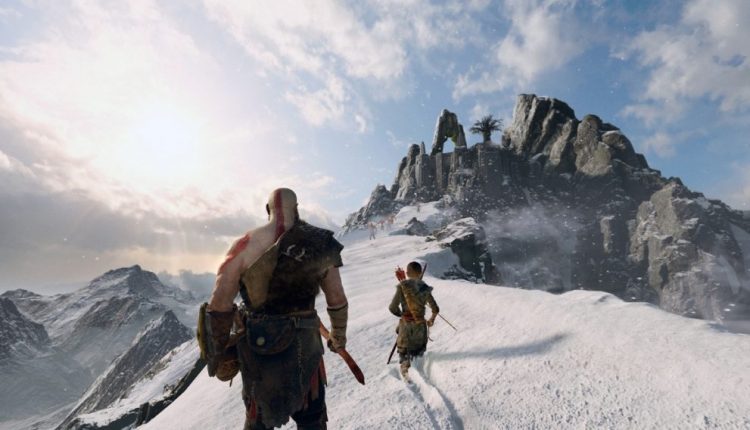God of War How the ending and its surprise came together
God of War was the surprise winner at this year’s The Game Awards, beating out the favorite Red Dead Redemption 2 for Game of the Year. Perhaps the reason that the smaller team (300 people) at Sony Interactive Entertainment Santa Monica Studio beat out the Rockstar Games team, with thousands of contributors, was that God of War had excellent writing.
The SIE Santa Monica Studio team spent more than five years working on the title, which came out in April and became one of Sony’s best exclusives on the PlayStation 4. I played through the game and felt like its ending resonated, much like Sony’s The Last of Us did.
While the game stretches over 40 hours, the beginning and ending of God of War come together, bringing into sharp focus the father-and-son story. Cory Barlog, the creative director at the studio, sat down with GamesBeat for a long interview about how the team crafted the story and mechanics of God of War. In this part of the interview, I’ve extracted our discussion on the ending, which delivers a surprise.
“We’re going to start, and we’re not going to explain everything right away,” Barlog said in our interview. “We’re going to give you really powerful moments that feel important, but you don’t understand why. That way you’ll look back, and they’ll have even more weight. But we want you to feel like you’re participating in the tail end of everything and have this sense of what happened.”
We talked about the symmetry between the beginning and the ending. In the first two questions, Barlog addresses how the team had the design freedom to find the beginning and ending that it wanted. And he revealed how two of the game’s characters — Freya and Baldur — were a kind of mirror to the relationship between Kratos and his son Atreus. Our discussion of the ending of the game sets the stage for what will come in the future of God of War.
Here’s an edited transcript of our interview. We’ll also be publishing our full interview, and other parts of the discussion, separately.
Spoiler Alert — This interview has lots of story spoilers for those who haven’t finished God of War.
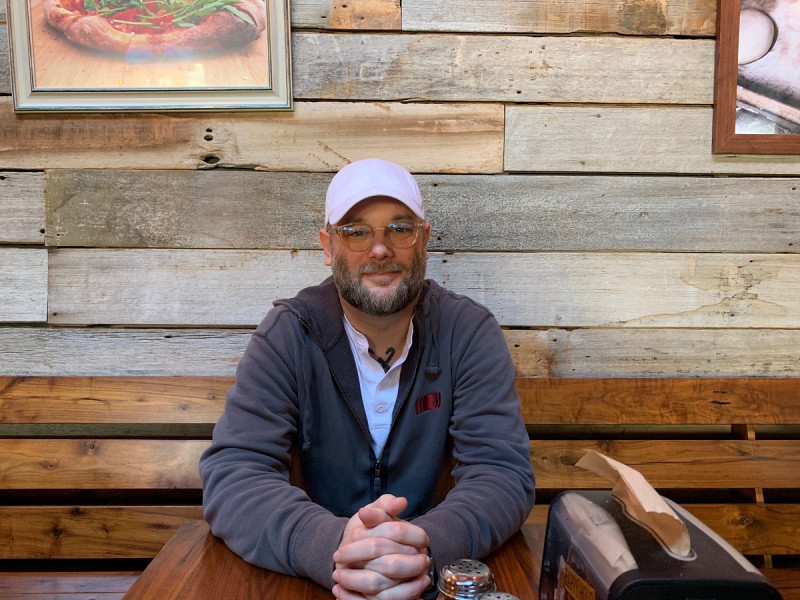
Above: Cory Barlog, the creative director at SIE Santa Monica Studio.
You had this design freedom. I’m curious about what that actually meant. When you talked to your bosses, what were those conversations like? How did you get the license to just do what you thought was best?
Barlog: Some of it deals with the fact that I worked on the franchise before. But I think that’s a small part. The reason that happens is people like Shannon Studstill and Yumi Yang. Basically, they’re the two partners I had through this entire project. They’re the shields, and they’re the swords. They protect, and then they fight back the hordes.
Shannon is there all the time letting everybody know — even if you’re not seeing anything, good things are happening. Have faith. She’s a staunch defender of the creative process. She knows that the creative process doesn’t always bear fruit for a while. It’s easy to get nervous. “Nothing’s being shown. Are you guys messing this up?” At times we show them stuff and that’s what they think. “You’re messing this up. This is terrible.” But it’s the sense of having that partnership where — you always have somebody who has your back.
In the beginning, the very beginning, there were a few discussions with certain groups within the company that had said, “I don’t think you should keep Kratos.” Certain people were saying that keeping Kratos was a good idea. I was being very closed about how much information I was handing out, but they all assumed that if I kept Kratos, we’d just make another God of War. At the high level I was saying, “We’re not going to do that. I’m not telling you what it is yet, but here’s the little bits of information.”
They said, “We think it’s a bad idea to keep Kratos. I don’t understand.” One person even said, “Is he going to put a backpack on and walk up to Scandinavia?” At the time we were pretty close to making that decision. We were in the final stretches, but we weren’t telling everyone at the company about it. He said that negatively, but it was actually, literally, that’s what we were going to do. I pitched him, the same person who said that, about a month later when everything was finalized, and he said, “I love this.”
It was a good example of that sense of — we don’t know what we want. We think we know we don’t want something. But if you can figure out the right mixture, suddenly it sounds great. That’s a testament to, one, the creative support I have from the partners, and two, not telling anybody anything until I figured it all out. When you pitch a half-baked idea, it’s so easy for someone to pick it apart and hate on it.
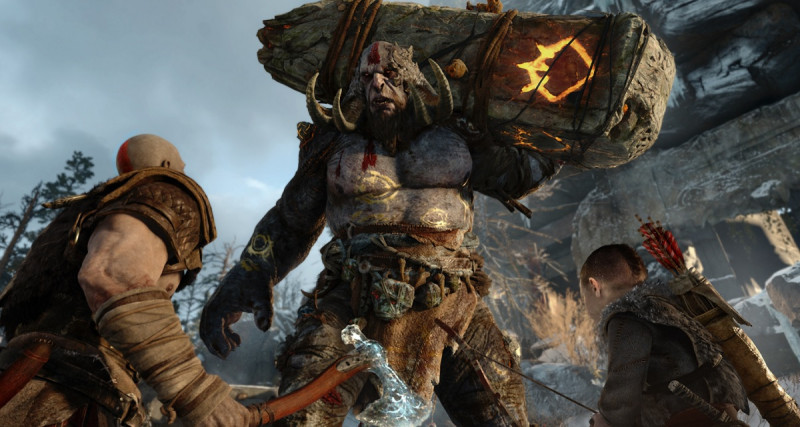
Above: A troll fight in God of War
Image Credit: Sony
Did you bounce it off of anyone like Shannon? Or did you go to Shannon saying, “Here’s why you should trust me because I’m going to figure it out”?
Barlog: I’ve worked with Shannon since 2003. Her and Yumi — I have an inherent trust with them. But she’ll say, “Barlog, you have to get it together. I need a pitch. I need to know what’s going on.” There was a moment, when I had realized that we were writing the wrong game in our first draft — the focus went away from the father-son story and went far more into the plotting and all the other stuff. That was seven or eight months and I had to throw it all out. We had an outline and everything and I had to get rid of it. I knew it would make the writers upset.
I went to lunch with Shannon and said, “I know you’ll get upset about this, but I’ve been going down a blind alley. I have to go back out and re-assess. Here’s my high level.” This was before the action and the mother. This was just Kratos and his son on a journey. It had no heart to it. I realized that we were in the middle of a story, but not in a good way. I said, “I don’t have it all figured out yet, but here’s the highest level. It’s Kratos and Atreus trying to go to the highest mountain to spread his dead mother’s ashes.” She said, “All right. Do it.”
It was literally — at any other company you’d have to have proof and schedules and budgets and risk assessments and all that stuff to make that kind of change. It was at lunch where I gave her one sentence and she said, “You’re right. That’s better.” Before, she wasn’t saying what I was doing was wrong, because I don’t think either of us had figured it out yet. But once I’d gotten to that one sentence, there it is. That’s it. That’s the thing. I kept telling everyone, “This is what we’re doing. This is the goal.”
Then that became the battle of, well, who’s the big bad guy? After a year-and-a-half, two years, I thought, well, there’s not going to be an antagonist in the same fashion. The antagonist is Kratos. It’s his inability to be open, his inability to actually be a dad. Baldur is a mirror. He’s not even an antagonist. He’s a mirror. His relationship with Freya is this sense of — she held on too tight. She made decisions for him. In doing so, she destroyed the relationship. This is the cautionary tale for Kratos. Do not make decisions for your kid. It’s not going to turn out well. He needs that reminder.
Every single element of the story deals with familial relationships. At all times, every character he interacts with is teaching him a good or a bad lesson, a caution. Don’t go down this road, or you should listen to me about how to be a family, how to be part of a family, and the responsibility. Whether you’re a kid or an adult in that family, you have a responsibility toward the communication and well-being of the family.
GamesBeat: Why did the beginning turn out the way it did? I looked back on a lot of beginnings, and this one was very good. It has a lot of confusion and mystery. You don’t know what’s going on. Why is she dead? You start in the middle of things, like in the ninth year of the Trojan War. It seems at first like the best part of it was at the beginning, but you’re starting almost toward the end. Why did you start in the way you did?
Barlog: That was a very deliberate thing. It took a bit of selling to people. We never do the beginning of the game until the end, but I knew right at the start of the project that I had to start convincing people. We’re not going to start the game with a giant boss battle. Early discussions, I was already laying the groundwork. In the previous games, we were all about that first 10 minutes with a big giant creature. It was great, but it was also really hard, by the time we got to God of War 3. You ended up in this arms race. “It’s big, but it’s not as big as that other one.” You’re always comparing it to the previous one and going thumbs up or thumbs down.
We couldn’t do that anymore. We had to throw that arms race out. We had to focus in on what’s interesting. I use the example of Buffy the Vampire Slayer, when they introduced Dawn as Buffy’s sister. They started the episode with the fact that everybody understood and accepted that Dawn was her sister, even though she’d never appeared in the show at all before. They just moved on. I think it was two episodes before they told you that it was a spell and it was all crazy and that’s why everyone was going along with it.
I thought that was really interesting. We’re going to start, and we’re not going to explain everything right away. We’re going to give you really powerful moments that feel important, but you don’t understand why. That way you’ll look back and they’ll have even more weight. But we want you to feel like you’re participating in the tail end of everything, and have this sense of what happened.
The first time I pitched Shuhei Yoshida [the president of Sony Worldwide Studios] on the game, I couldn’t get a minute-and-a-half into my pitch before he said, “Who’s the mother? What’s her name? Where is she from? Is she going to appear in the game? What does she look like?”
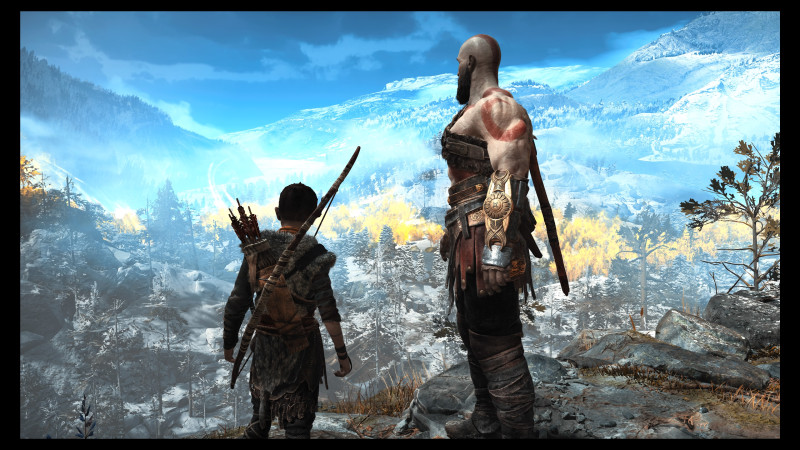
Above: “Look, Atreus. Everything the light touches is our kingdom.”
I felt like the end is good. It reflected a lot of that thinking. Again, it’s tightly woven. You go back and you realize — like, why is he calling him “boy” in that insulting way? Or even the fact that you’re somehow drawing attention to how Kratos doesn’t call him by his name. Were you trying to hide his identity, even that early?
Barlog: It’s a very interesting story about that one. This is the beautiful thing about the agility of storytelling, and being agile when you’re writing and directing something. Initially the plan was, the name would be the reveal. At the end of the game, even calling his son by his name, thus acknowledging and accepting him. Then we realized that probably wasn’t the right thing. But I was also using “boy” because I couldn’t think of a name.
The first stab at it, he was just going to call him by his regular name. But then we thought we had this great idea. What if he only refers to him by name at the end? That’s good, because it gives me more time to stall and come up with the name. Then we realized that’s not the right beat. At the end of the game, he has to accept him as his son. That has to be the first time he says “son.” Because that’s so charged. It’s what Zeus used when Kratos killed him. He calls him “my son.”
That’s so emotionally charged for him that he doesn’t want to do that. He doesn’t want to acknowledge this kid, even though he’s important to him. The kid represents a second chance for him, but he’s still not ready to open up to him. But yeah, I didn’t have the name Atreus, I think, until probably a week before we released it in the metadata of the music tracks. I waited until the last minute.
We had so many names, hundreds of names, and I really liked Atreus. Everyone realized I was a fan of the Neverending Story and they said, “But it’s just like Atreyu.” And I said, “No, it’s a cool reference. It’s also a great mystery. People will think he’s named after the mythological Atreus and they’ll all go in that direction.” Because that’s not really the story of where he comes up with the name. Whatever name we choose, it’s going to be a soldier that Kratos served with. It’s going to be a personal thing for him. We had a name that kind of has a connection with Greek mythology, and everyone would start reading into it, all these different things.
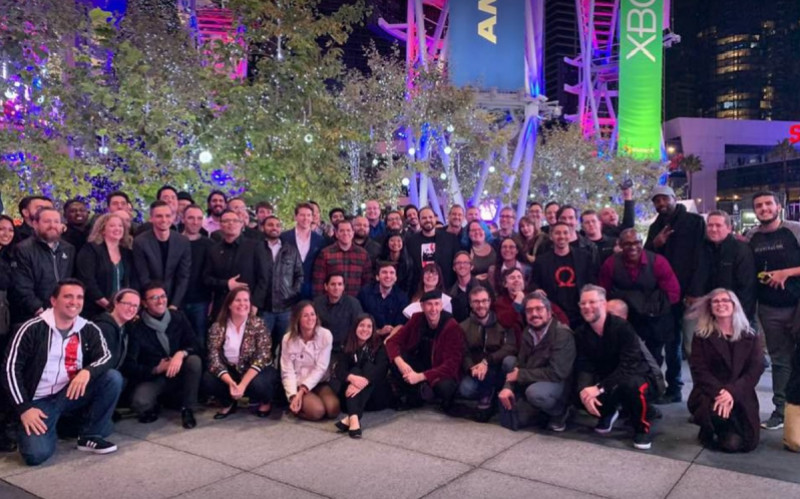
Above: The God of War team celebrates victory after the Game Awards.
Now that we’re a bit more free to talk about endings, there’s the one name you discover at the end, and the immediate association is with a bad guy. Everybody knows this name as somebody who’s not — who doesn’t turn out well. And then he’s telling you the actual story of Atreus’s life at the end. I thought about it more and realized, what if you actually have a choice between being the other guy or Atreus? Atreus is a very noble character. He does a lot of good. Maybe this boy has a choice between whether he wants to turn out like this other name.
Barlog: There was a thought that went into that in the sense that — our identity, who we are, how much is shaped by our environment, how much is shaped by the expectation of who we are. To me, Loki is a great representation within the Norse myths of a child. Mischievous, trickster, getting into things. But not necessarily with dark intentions. There’s a little bit of darkness in the Eddas, but it’s not as exaggerated as it is in the Marvel comics.
But Thor, in the mythology, is a mean guy. He’s not a nice dude. We probably exaggerated him a little bit, but this guy literally was going to take children in payment for a slight. He was going to kill these people, kill a family because they slighted him, and they said, “Please take our children,” and he said, “OK, I won’t kill you. I’ll just take your children.” He’s not a good dude.
I liked the idea that setting these two things up shows that there’s an expectation, what people think Loki is really about, that’s really a neat little cloud that hangs over him. Then he gets to figure out, what is — who am I? It’s what we go through. It was, subversively, what Kratos was going through in the beginning of the game. Who am I? Who have I been for so long? This freight train of vengeance and violence. That’s still part of me, but who am I, now that I have this responsibility? Who am I, now that I’ve grown and been fundamentally changed by Faye?
Their relationship changed him so dramatically, but still, he was in the middle of it. He hadn’t finished growing. Her leaving so quickly, that basically prevented him from finishing that growth. He had to finish it with his son. He had to finish it on his own. That’s an important thing for everyone, to grow on their own.
GamesBeat: You have a son. I wonder how much you see your relationship with him in this game.
Barlog: So much. There’s so much of this — the way that Kratos views godhood as a disease he’s passed on to his kid, is the same concept I look at my kid, with my own psychological idiosyncrasies, my own obsessive-compulsive nature. He’s exhibiting all of that. I gave him that, because my wife is not that way. My wife has anxiety, but she’s nowhere near that — everything has to be done in a certain order, and my kid is that times 1,000, which is so heartbreaking. It’s the same way that — in that moment when Atreus rages out at the end of the game and knocks himself out and nearly dies. It’s seeing that terrible part of yourself in your kid.
Moments throughout the game are pulled from my interactions with him, and my interactions with my dad. Matt and Rich both have kids, so their interactions. So many people on the team, they would tell us stories about interactions with their children or their parents. These little stories would find their way in. That’s really interesting. The test for us was — all three of us sitting around, we’d say, “Somebody told me this story today.” And if all three of us said, “Oh, I can relate to that,” we’d feel like we could have more people relate to it. It’s something universal.
There were some things we put in and it didn’t work out. People would say, “I don’t get that at all.” All right, we’ll take that out.
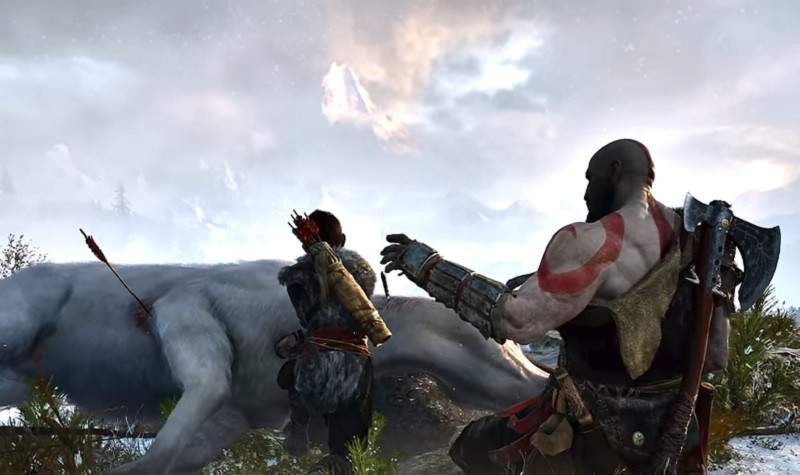
Above: Kratos tries to comfort his son in God of War. Tries, but fails.
Image Credit: Sony
I thought it was interesting that there’s this God of War game, and a God of War story, but then also this father-son story that explains a lot of what happens in the story. It’s not hammered home in a heavy-handed way. It’s unconsciously operating on you. You don’t have Kratos psychoanalyzing himself or anything, but that layer is there. I think that’s also interesting, about how this resonates.
Barlog: One, I work with really good writers. Those guys are incredible. But I think the time I spent with George Miller, understanding his process of breaking characters down — he worked with a writer, Nick Lathouris, on Fury Road. While they were developing the Fury Road script, Lathouris had broken down the entire script with one page of script and one page of line by line, psychologically, what each character was going through, either in the screen directions or the dialogue. What’s the motivation? What’s going on in their head?
Reading through that and realizing how much actually goes into a glance, how much goes into a grunt, made me realize, “All right, we have to think about this so much more deeply.” When we’re leading with, first, the story about growing up — it’s easy to say it’s redemption, but that’s not really what he was going for. It really was about growing up. Kratos figuring out how to grow up, us growing up. Part of growing up is that idea of passing on information. What is your legacy that you’re passing on? What is the responsibility of that legacy? Everything leads into that, throughout the whole game.
A lot of times you don’t start like that in games. It’s just, “I’ve got a cool mechanic I want to use, let’s do this!”


